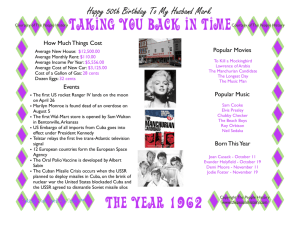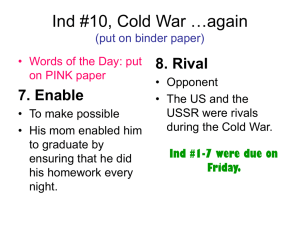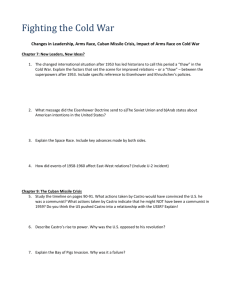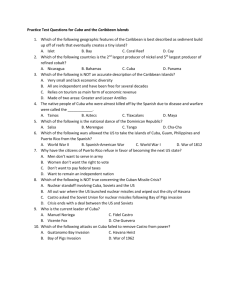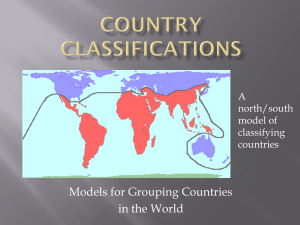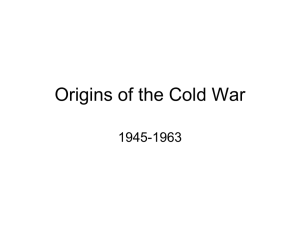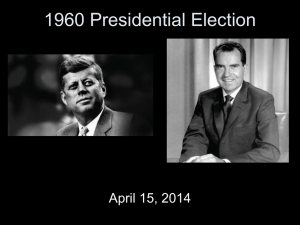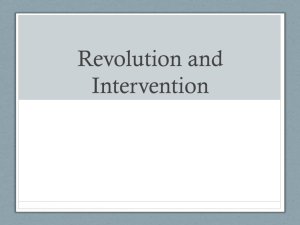Cuban Missile Crisis
advertisement
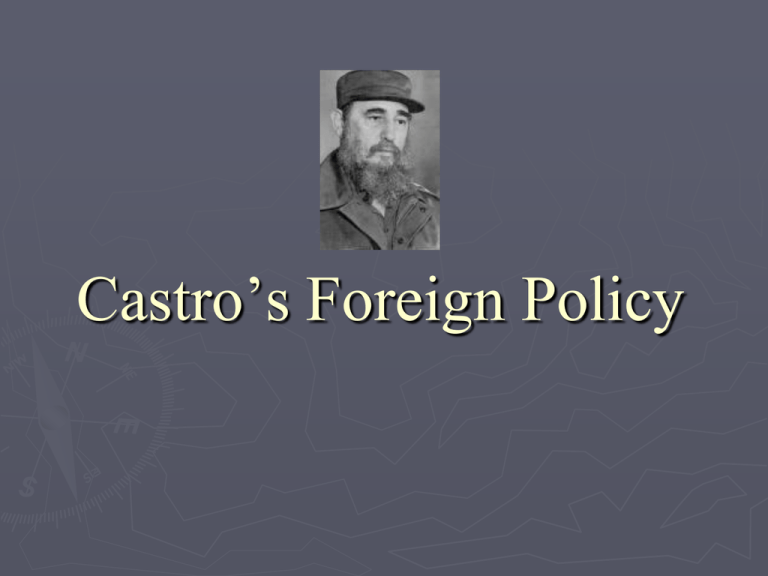
Castro’s Foreign Policy Foreign Policy ► His Nationalism…anti-US Imperialism – key feature of his speeches / broadcasts, at home and at UN meetings…. ► Did he try to work with, appease the USA……before visit and meeting with Nixon?....pace of expropriation / nationalization… ► did he unnecessarily antagonize the US gov. – documentary says yes, that US gov / ambassadors were willing to accept that the US was over-represented in the Cuban Economy but that Castro wasn’t cooperative ► Castro felt it was only a matter of time before he would have to consider turning to the Soviet Union for economic assistance….because of US attitude…..complaints about executions, Nixon, objections to Expropriations / Confiscations ► Eisenhower admin….did they unnecessarily alienate / fail to engage Castro? ► But also, he felt, for symbolic political reasons: there was no greater way for a nation in the Western Hemisphere to make a statement about its freedom from US domination than to deal with the Soviets on a friendly basis, no greater expression of Cuban nationalism, of the nation becoming a truly independent sovereign state (Bourne)…..to show defiance of / to US ► In the meantime, Cuba purchased arms from the Czechs and Belgians ► USSR interested too in developing a Cuban relationship / Cold War… made overtures about trade relations, leading to the visit of Vice Premier Mikoyan and the signing of a trade package, in Feb 1960. ► The USSR would lend Cuba $100m a year for 12 yrs at 2 and a half % interest, and would purchase 425,000 tons of sugar in 1960, and 1m tons a year during the next 4 yrs….replacing losses in US market ► Cuba would also sell citrus fruits, animal hides to USSR, and the USSR would sell oil, fertilizer, steel, iron, to Cuba and provide technicians to help build factories and replace the expertise of those who fled to the US. ► In March 1960 a vessel bringing arms from Belgium exploded in Havana harbor – killing 75 people – Castro drew parallels with the Maine and implicated the US ► CIA may have been involved but no hard evidence ► Castro, during the funerals, attacked the USA for its hostility towards Cuba, and for its past history of Imperialism towards Latin America. ► Cuba also signed trade agreements with Yugoslavia, Poland, China – all Communist countries in 1960 ► In May 1960 Cuba formally established diplomatic relations with the USSR when they exchanged ambassadors in Relationship with the USA, 1959 – 1960; Criticism of executions, attitude of Nixon / Eisenhower and Nixon during visit to USA, objections to expropriations / confiscation of US owned property, and amalgamation with Communist Party, trade ties with the USSR, Yugoslavia, Poland, China, and diplomatic relationship with USSR….all criticized by the US Gov. ► Deterioration ► US saw it as betrayal, deserting the West in the Cold War ► 1960 ► Congress / Eisenhower agreed to reduce Cuban sugar quota – described by Castro as an act of aggression ► Cuba purchased oil from USSR and requested that major oil refineries in Cuba – US owned: Standard Oil, Royal Dutch Shell, and Texaco – process and refine it. At urging of US govt. they refused. Castro then expropriated these refineries ► Congress approves of end to Cuba’s sugar quota, at Eisenhower’s discretion ► Cuba authorized the expropriation / confiscation of all US owned land in Cuba in response ► Eisenhower cancels Cuba’s sugar quota ► Confiscation of all large scale US owned industrial and agrarian enterprises is carried out ► CIA began to funnel money to various exile groups for arms and training ► Eisenhower acceded to the long standing pressure from the joint chiefs of staff and Nixon and the CIA to authorize the CIA to begin training and arming a Cuban exile force ► CIA sets up a training camp in Guatemala for an invasion force…hoped to link up with / inspire anti Castro groups in Cuba (had been a minor peasant uprising against Castro) ► All US banks in Cuba are confiscated ► US govt. prohibited exports to Cuba except for non subsidized foodstuffs and medicines ► Cuba expropriated or confiscated all US owned wholesale and retail trade enterprises and the remaining smaller US owned industrial and agrarian enterprises inc. Sears, Coca-Cola ► US withdraws ambassador ► Outgoing Eisenhower admin. severed diplomatic relations with Cuba ► As US-Cuban relations declined, a formal Cuban-USSR military alliance was added, in July 1960, to the trade and diplomatic alliances – the USSR promised to “use all means at its disposal to prevent an armed US intervention against Cuba”. ► In July 1960, Khrushchev suggested that Soviet missiles would be used to defend Cuba from an American attack ► USSR announced that it would purchase the 700,000 tons of sugar that the US had now stopped buying ► On April 15th, 1961, the Kennedy approved invasion of the Bay of Pigs took place ► Fiasco: ► 1. Kennedy did not want US involvement in the invasion to be obvious, was to be undertaken by a CIA trained exile brigade with minimal US assistance in the form of air support, to be made look like defecting Cuban planes; but at the last second he reduced the first air strike from 16 to 6 B-26s, which was ineffective in destroying all of Cuba’s air bases / air force, then cancelled the second strike ► 2. The invasion was based on the false assumption that it would have popular support and inspire a popular uprising – failed to do so ► 3. Castro had knowledge of invasion plans, reported in Miami and Guatemalan newspapers, had arrested all counterrevolutionary elements in days preceding invasion, and had Soviet weapons, advisors, an enlarged army, navy, air force, at his disposal ► Rather than being overthrown, Castro’s prestige and popularity soared to new heights - he had done what generations of Cubans had fantasized about, he had taken on the US and won (later got $53m from US in food and medicine in ransom for captured invasion force) that year – 1961 – Castro announced that he was a Communist (Documentary says he announced just before the Bay of Pigs attack / invasion that he was a “socialist”), that he had been a Communist since his days in College, but had disguised this fact, to advance his movement, that his revolution was a Communist, Marxist-Leninist revolution…. followed by 20,000 arrests of opponents ► Later ► But says that now he wanted people to finally know what they had fought for and were working towards, and why solidarity with the USSR was so important ► Historians are skeptical; Bourne says that he had shared many of the idealistic goals of his Communist friends while at the University but was certainly not a Communist then in the traditional sense. ► Bourne ► 1. explains his Conversion in 1961: He could not have established Cuban independence without the patronage of the USSR – he went over to Communism to get the military and economic support he needed. Without doubt, adopting Communism provided him the most potent symbol with which to assert his independence from the US (survival, independence) ► 2. Marxism was “an ideology that would allow him to justify assuming total power and keeping it for the rest of his life without being accused of being just another Latin American dictator driven solely by a desire for power and personal aggrandizement”. ► Theodore Draper also agrees that Castro was not a Communist when he claimed he had been. Cites his constant denials, and his harsh criticism of them, and their criticisms of him ► “Historically, then, Castroism is a leader in search of a movement, a movement in search of power, and power in search of an ideology. .he won power with one ideology and has held it with another. This is perhaps the most peculiar aspect of the Castroite phenomenon.” ► Draper suggests that he may have exchanged control of one superpower for another – but at least the USSR was further away ► Yet, Castro also made a point of asserting Cuba’s independence from the USSR, and was a headache to the USSR on many occasions ► US begins covert campaign to assassinate Castro (managed by Robert Kennedy, Attorney General…all failed. Also included sabotage of industry / economy)….he felt another US invasion was a strong possibility, by US troops, not exiles ► In 1964 Castro back-tracked somewhat on his declaration that he had always been a Communist when in an interview he told NY Times journalist Herbert Matthews that the revolution “was a gradual process, a dynamic process, in which the pressure of events forced me to accept Marxism as the answer I was seeking….as events developed after the revolution I gradually moved into a Marxist-Leninist position, I can not tell you just when.” …. the most likely explanation – he was not a Communist before – he changed, evolved…change brought on by needs. ► Seems ► (Discuss his conversion to Communism under domestic Political Policies) ► Cuban Missile Crisis ► In the wake of the failed Bay of Pigs invasion, the USSR pledged to defend Cuba in the event of an attack by the USA and stepped up its flow of arms ► Khrushchev felt, after meeting with Kennedy at Vienna, that he was young, inexperienced, and lacking toughness – he would be the first to blink in a confrontation…… ► Decided in March-April 1962 to use Cuba as a strategic pawn in the struggle with the US (for Berlin esp.) by placing nuclear missiles there (Defense and Leverage – Atomic Diplomacy??) ► Bourne suggests that Castro’s first concern was the security of Cuba from US attack so he wanted short range, defensive missiles, but Khrushchev wanted medium and long range offensive missiles – and got his way ► Castro stated that his acceptance of the Khrushchev plan was “an act of gratitude and Socialist solidarity…..to strengthen socialism on an international scale.” (told Khrushchev that he was willing to sacrifice Cuba in the interests of international Communism….Khrushchev was astonished and felt Castro was insane) ► USA discovers the existence of missiles, demands removal and sets up quarantine, standoff for 13 days…. Khrushchev / Kennedy deal – USSR will withdraw all missiles in return for a promise from the US to never invade Cuba, and that the US would take its missiles out of Turkey ► Castro was a non player in the whole affair; upset he was not consulted: felt the Soviets had abandoned him and made a deal with the US…treated Cuba as badly as US had in the past…used it ► But he had really won big; as it turned out - Cuba would be the “big winner” in the whole Cuban Missile Crisis; security was guaranteed / the US would never again invade....though he never again fully trusted the USSR…invited to visit USSR to patch up relationship….trade relationship improved – USSR bought more sugar and sold more products to Cuba ► Cuba was now truly independent of the US: it had been given the right to have in the Western Hemisphere, a govt. of which the US did not approve, with a guarantee that there would be no US military interference or invasion ► US efforts to subvert and harass the Cuban Rev. with the aid of counterrevolutionary Cuban exiles contd. They included CIA sponsored raids against refineries and ports, infiltration of US agents, and even some bizarre attempts to assassinate Castro. Kennedy called these off after Cuban and USSR complaints… “and it was a decision that may well have cost him his life.”… (Judge and Langdon) ► Castro, in 1963, anxious to show his independence from the USSR, tried to improve relationship with the US ► Cuban delegates to the UN met with US delegates to convey message that Castro was interested in some kind of accommodation ► Kennedy encouraged the discussions, but before progress could be make he was assassinated. ► One of the conspiracy theories was that he was murdered by the CIA – to prevent talks with Castro developing (Mafia, Castro… conclusion of Warren Commission – a lone deranged gunman) ► Talks with US not resumed until Carter regime…detente, / tried to improve relationship, but destroyed by Soviet invasion of Afghanistan. Return to hard line policy under Reagan / escalation of Cold War, and US activities in Latin Am, El Salvador, Granada, Nicaragua. ► Cuba is now on good terms with most nations, but not the USA – embargo still continues, in spite of appeals from UN, Latin American countries, even Pope, to end it ► US has normalized relations with former and continuing Communist countries but not with Cuba ► US passed Torricelli Act in 1992 (US companies operating in Third World could also not trade with Cuba…) Helms-Burton Act, 1992….US companies who had property / businesses nationalized could sue foreign companies who benefited from acquiring these….. ► The ► Why is US still so hostile to Cuba? ► Presidents have resisted dialogue because of backing they get from anti Castro Cuban-American Community. ► Payback for Cuban Missile Crisis. US continues “to harbor cold war prejudices and illusions about Cuba that it abandoned long ago about a much more powerful communist state, the PRC.” Keen ► World Scene ► Castro insisted on the independence of his foreign policy, asserted right to make its own foreign policy decisions without interference from its new ally, the USSR (didn’t get on as well with Brezhnev as with Khrushchev) ► Assisted in revolutions in Zaire, Tanzania, Algeria, Ethiopia, Angola…..idealistic (Che Guevara’s influences…they later fell out / 1966….Che left...later killed in Bolivia while trying to encourage communist revolutions throughout Latin America) ► 11,000 Cuban troops assisted Ethiopia in repelling the 1978 invasion by Somalia ► 50,000 Cuban soldiers helped Angolan govt. forces in their 14 yr struggle against counterrevolutionary rebels supported by the US and South Africa ► 1988; helped secure the independence of Namibia from pressure from South African, who withdrew its forces by agreement ► Castro also tried to spread Communism in Latin America, promising to turn the Andes into the Sierra Maestra of South America, but most Latin American countries and their leaders bitterly resented Castro’s interference in their internal affairs ► In the 70s Castro changed course and sought to reestablish normal diplomatic relations with other governments of the hemisphere ► Cuba still sponsors what is considered the greatest Peace Corps program of civilian aid in the world – 16,000 doctors, teachers, construction engineers, agronomists, economists, serving in 22 Third World countries ► Bourne explains; “Part of the problem was his preoccupation with the expansion of Communism to other Latin American countries – Guatemala, Chile, Granada. He wants to thrust himself on the world stage, he desires historical stature – which involves a huge commitment of resources and manpower. Most Cubans would probably be willing to trade some of the international prestige Fidel has brought to them for even a modest improvement in their standard of living.”
